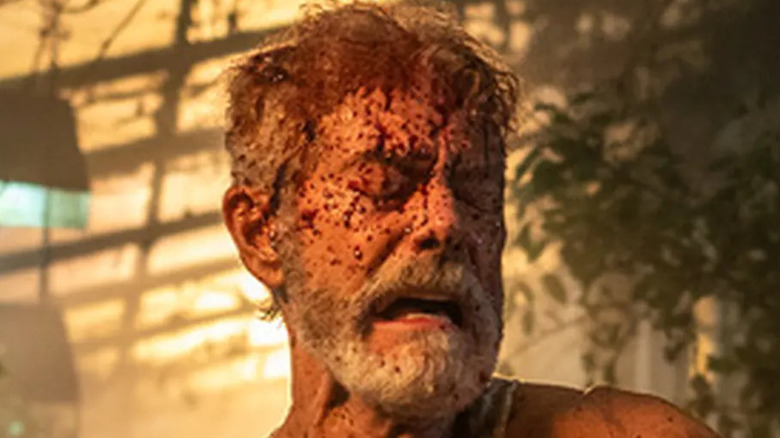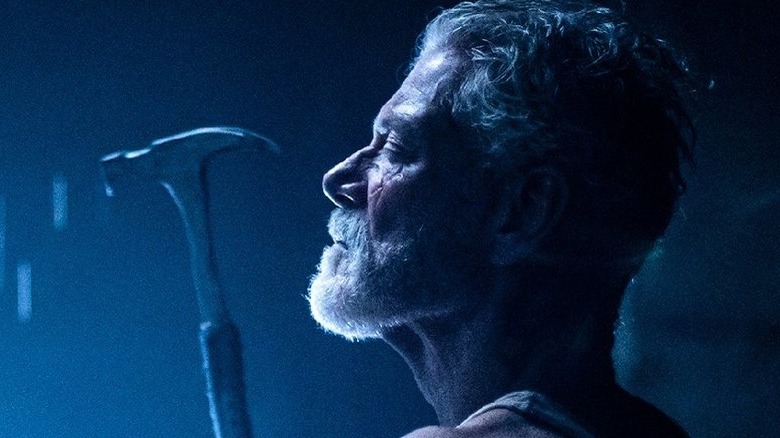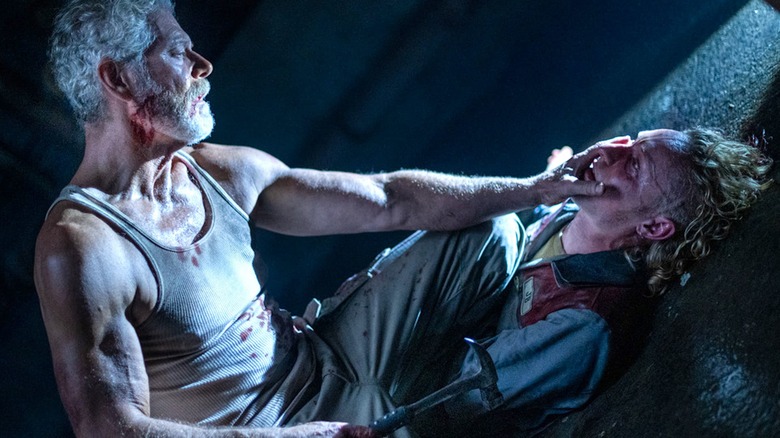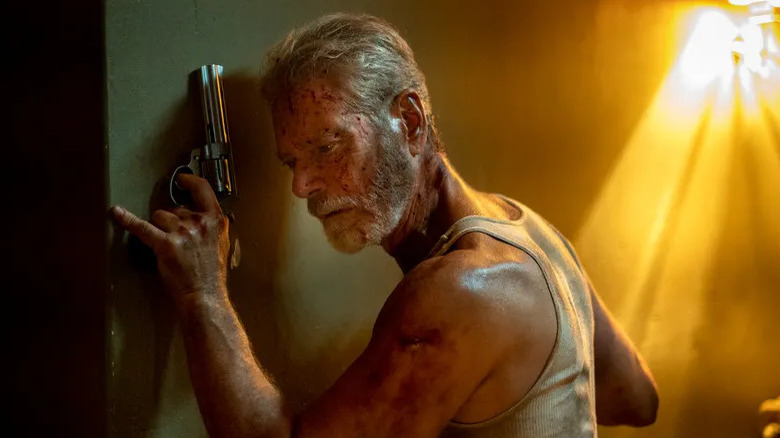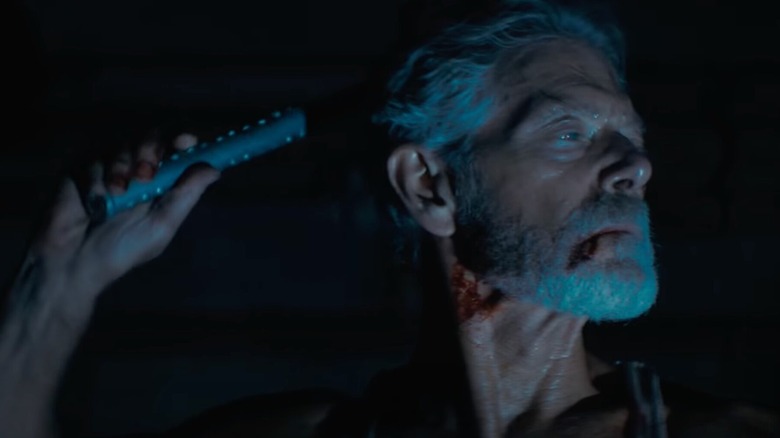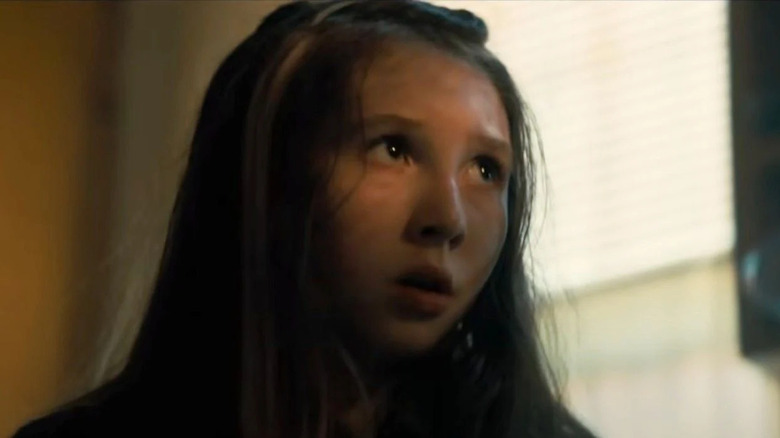The End Of Don't Breathe 2 Explained
2016's "Don't Breathe" was a breath of fresh air — a smart, twisty, lean, mean horror film that took the villains and hero from the first act and slowly made them switch places in the hearts, minds and sympathies of its audience. Produced for barely $10 million and grossing nearly 16 times that at the box office, it was also a huge success. But the film did have one problem: It didn't scream sequel.
Now, "Don't Breathe 2" is here, "The Blind Man" is back and — he's apparently the hero? Veteran actor Stephen Lang ("Manhunter," "Gods and Generals," "Avatar") was a beast in the first film. A miserable old blind vet living alone, mourning the death of his killed-in-a-car-accident daughter when three robbers broke into his house in an all-but-abandoned section of Detroit, causing him to stand his ground — and protect the demented secret hidden in his basement.
By the end of the original "Don't Breathe," moviegoers learned The Blind Man wasn't as innocent or helpless as he seemed. Not only had he murdered and maimed the thieves, but before he did they discovered he had the acquitted woman who had killed his daughter tied up in the basement of his home, forcing her to carry his child to term. After that woman was killed, he tried to tie up and impregnate Rocky (Jane Levy), the female robber and eventual sole survivor of the struggle.
Rocky got a happy ending at the end of the first film — but in "Don't Breathe 2," the ending is far more complicated. If you aren't concerned about spoilers, read on for a dissection of the final moments in "Don't Breathe 2."
The set-up
"Don't Breathe 2" is set eight years after the events of the first film, and brings us The Blind Man (now identified as "Norman Nordstrom") living a (mildly) happier life in the suburbs with an 11-year-old girl named Phoenix who he identifies as his "daughter." True to his nature, he is raising her as a survivalist and a relative shut-in. The two of them have a vicious dog named Shadow.
We learn that Phoenix isn't really his daughter at all, but another victim of The Blind Man's demented yearning to once again have a child of his own. Since her youth, Phoenix has been told that Norman was married to his mother, their house burned down, and she was killed in the fire. As it turns out, that house was a meth lab, it exploded, and Norman discovered "Phoenix" in the aftermath and took her home. The real father Raylan (an excellent, tremendously menacing Brendan Sexton III) was arrested and spent eight years in prison; the mother, as it turns out, is alive but on the verge of succumbing to aftereffects of the chemicals and smoke from that explosion.
The film's finale arrives after Raylan and his crew invade Norman's house, beat him down and take Phoenix back. Raylan tells her that her real name is Tara, introduces her to her clinging-to-life mom, and a family reunion seems in order — until Raylan reveals that the only way to keep dear ol' mom alive is a heart transplant, and they've made plans to turn Phoenix into an unwilling organ donor.
Who lives, who dies
In the final moments of any horror film, it often comes down to moral judgement in the form of comeuppance, with life as the reward and death as punishment. "Don't Breathe 2" strongly subscribes to this theory — and much like the first "Don't Breathe," it wants to operate in the grey areas between who is good and who is bad. It's just not nearly as good at masking its audience manipulation.
Once the mostly-nameless, mostly-faceless supporting villains have been dispatched by Norman, he reaches the film's boss level. Now on Raylan's turf (which can best be described as having a "long-abandoned YMCA" vibe), Norman must make his way to the extremely-unhygienic location where an evil surgeon (Steffan Rhodri) plans to make the heart transfer — while Phoenix is still awake, no less.
Thankfully, Raylan's right-hand man Raul (Christian Zagia) decides he's had enough after Norman pretends to be unconscious, then uses the ruse to mow down Raul's men in a blaze of gunfire. Raul tells Norman where everyone is, then washes his hands of the whole situation.
Largely viewed offscreen, Norman ambushes the disgraced surgeon (who, like Raul, is trying to abandon this mission-gone-sideways) and leaves him bleeding out. As Norman confronts Raylan, a battle ensues and bullets start flying. Caught in the carnage is Phoenix's mom, handcuffed to her and in a wheelchair. When the wheelchair rolls into a nearby, empty swimming pool, a Hans Gruber moment ensues and Phoenix must make a choice: grab a hacksaw and cut through her mom's arm, or take the fall with her. Let's put it this way: There will be blood.
Norman seems to win the battle with Raylan, putting his fingers into the man's eyes and saying "Now you'll see what I see," then pushing his thumbs deep. Raylan's body goes limp, apparently dead, allowing Norman to have a moment with Phoenix. But then a double (!) surprise-stab occurs when Raylan resurfaces and stabs Norman, then Phoenix resurfaces behind Raylan and stabs him.
The film ends on a somewhat-uplifting note as the girl finds her way to a children's shelter. Joining the group of happy-looking kids out front, they ask her name. She considers everything that just transpired for a moment, then answers: "Phoenix."
Is The Blind Man a bad guy?
The first "Don't Breathe" gave us plenty of reasons to cheer for Norman — he's a veteran who lost his sight in the Gulf War, his daughter was killed in a tragic car accident, he was wronged by the justice system that let her killer walk, and he's an old guy in a dilapidated house who just wants to be left alone. By the end of the film, it had also given us plenty of reasons to feel bad about cheering for him — he seemed to take a sadistic glee in hunting and murdering the home invaders, he had abducted his child's killer and tied her up in his basement, and despite his protestations to the contrary, he was a rapist.
"Don't Breathe 2" seems to go the opposite way. At the beginning of the film, he's not only carrying all the baggage from the first movie that would have the audience decidedly not on his side, but Norman has now abducted a little girl, raised her on lies, and is treating her like a caged bird. But by the end of the film, he has somehow made inroads towards redeeming herself by serving as her protector and repeatedly sacrificing himself to keep her evil parents at bay.
How you feel about Norman at the end of "Don't Breathe 2" will play a big part in whether you like or dislike its ending. Another factor that will play a big part is how you interpret his final words.
When it seems as though the threat has subsided and Raylan is dead, Norman and Phoenix share a moment. He is banged up and bloody, no doubt, but the old man seems likely to live. That's when he begs her to leave him, saying: "I've killed! I've raped!" It's that second part, oddly enough, that is open to interpretation.
A masterful filmmaker is good at manipulating the audience like a marionette while hiding the strings they use to elicit sympathy, happiness, anger and other emotions. "Don't Breathe 2" does not show many signs of a master filmmaker at work, and a skeptical interpretation of the "I've raped!" line could be that director Rodo Sayagues (failing miserably to walk in the same shoes as first installment filmmaker Fede Alvarez) needed Norman to say that so the audience would turn against The Blind Man, pleasing them when he is apparently mortally stabbed seconds later.
A less-skeptical interpretation could be that Norman screams "I've raped!" to show character growth in his final moments. In the original "Don't Breathe," he went out of his way to tell Rocky that he is not a rapist, but simply someone who offered his captive a deal that she willingly accepted: If she allowed The Blind Man to impregnate her and then carried the baby to term, she would be set free. It's horrific, obviously — but in his twisted mind, it allowed him to justify his actions.
So, which do you believe? Is "I raped!" an exploitative line meant to make us once-and-for-all want The Blind Man dead? Or a last-minute confession that shows he is ready to accept punishment and confess to all his sins?
Save me
Moments after the aforementioned exchange, Norman is stabbed and seems to be on the verge of death. Phoenix begs her quasi-father to hang on, showing not only that she cares for him, but also that she forgives him for what he's done. "I can save you," she insists.
"You already have," he replies, and then he's dead.
It's a rare, sweet moment in the "Don't Breathe" series. It's also somewhat disheartening if you take the "I raped!" line for what it should be — a confession that he has committed such awful crimes. While Norman's murders could perhaps somewhat be justified — the killings we witnessed all had extenuating circumstances of self-defense and home invasion, and took out some very bad people who likely would have murdered and otherwise harmed others. But rape? Do we really want to think he was "saved" from any guilt there?
Again, it's open to personal interpretation and introspection. Would you want to "save," or effectively absolve, such a man on his death bed? At times, "Don't Breathe 2" feels like a really dumb film — but it does give you something substantial to chew on at the end.
Does Phoenix get a happy ending?
By choosing the name "Phoenix" to introduce herself to the other children at the shelter, she is effectively choosing to go forward in life while embracing the heritage instilled in her by The Blind Man. Norman certainly had his issues, but he did teach her self-reliance, a valuable suspicion of her fellow human beings, and perhaps the resolve to live a better, more open life after seeing the prison his existence had become.
If she had told those kids her name was "Tara," that would most likely have indicated that she wanted to put the Norman-era of her life behind her. That she would ignore his teachings, suppress memories of the man, and instead try — most likely, failing — to resume the life path she had originally been on before the meth explosion. With both of her birth parents now gone, what could she even go back to? Obviously, she remembers very little of them — and whatever lessons they imparted on her during her first few years of life most likely aren't worth taking forward.
Instead, perhaps she should have gone a third route. Phoenix/Tara could have given a third name, making something up on the spot, to indicate a rebirth and a new person to develop. That might have been the most uplifting ending, especially because the audience had been seemingly conditioned to despise Norman (via his rape admission) just moment before. Okay, he said she "saved" him — but are we really supposed to want Phoenix to grow up to be like The Blind Man?
If you or anyone you know has been a victim of sexual assault, help is available. Visit the Rape, Abuse & Incest National Network website or contact RAINN's National Helpline at 1-800-656-HOPE (4673).
